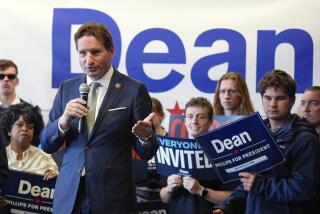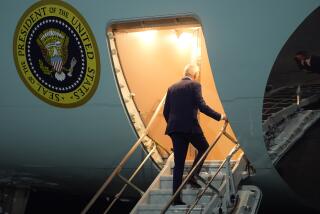Joe Biden decides against presidential bid, a big boost to Hillary Clinton
His agonized decision-making captivated political activists for weeks, generating a fever of speculation about whether Vice President Joe Biden would enter the race for the Democratic presidential nomination — a move that could have created a formidable obstacle to the front-runner, Hillary Rodham Clinton.
In the end, though, Biden said, he had simply run out of “the time necessary to mount a winning campaign.”
His announcement significantly boosted Clinton’s prospects for winning the nomination, but left in place the anxiety among some Democratic activists that had first spurred talk of a Biden candidacy: the fear that public doubts about the former secretary of State could make her a weakened candidate in next year’s general election.
In the last couple of weeks, a raft of polls have tested how the race would look with and without Biden. The surveys offered a consistent verdict: that Biden would have started with support from almost one-fifth of Democrats, and that that backing largely would have come at Clinton’s expense.
Over the summer, while his family grieved over the death in May of his son Beau, the vice president kept saying that the window for a presidential run might close before they were ready to decide.
“I’ve concluded it has closed,” Biden said Wednesday in the White House Rose Garden.
Biden’s announcement, with his wife, Jill, and President Obama at his side, signals the approaching end of a four-decade career in elected office and a quest for the presidency that stretched for more than a generation.
Biden’s speech contained at least one thinly veiled criticism of Clinton — a warning against excessive partisanship — and although he did not mention her name, he challenged her on policies. Overall, however, his decision helps her campaign.
“More than changing the race, his decision confirms what we know, which is the nomination is hers to lose,” said longtime political analyst Stuart Rothenberg. “It removes a question mark; it removes an alternative who could have taken advantage of another stumble if she did that.”
Said Democratic strategist Joe Trippi, Biden “was the only one who could conceivably have given a real challenge for the nomination. But he was going to have a very hard time doing it.”
Even more important than the raw numbers were the types of voters Biden potentially could have attracted.
Sen. Bernie Sanders of Vermont, Clinton’s main remaining rival, has gathered strong support among white, college-educated liberals who share his strongly held views about income inequality and his critique of big banks and corporate power.
But Clinton has stayed well ahead of Sanders in national polls and in surveys of most heavily Democratic states because of lopsided support among black and Latino voters and self-identified moderates.
“She’s slightly more moderate. Bernie has the progressive base. Hillary is strong with people of color. It’s like they have the whole party divided up between Bernie and Hillary,” said Paul Begala, a former top aide to President Bill Clinton who now advises a pro-Hillary Clinton super PAC.
“It’s hard for me to see a strategic lane” that Biden could have claimed as his own, Begala said.
But a Biden candidacy could have threatened Clinton’s bulwark among moderate and minority voters, potentially holding down her vote enough to allow Sanders to defeat her in key contests.
Clinton still faces a spirited challenge from Sanders. “She still needs to earn this. Bernie Sanders is still a formidable threat and could still win the first two states, and nobody knows what will happen if that kind of jolt occurs,” said Paul Maslin, a veteran Democratic strategist who is neutral in the primaries.
“The positive part is it avoids a bloodletting,” Maslin said of Biden’s decision not to run. “There’s not that much difference between the two of them, so his argument would had to have been, ‘I’m genuine, I’m real, I have good character and she does not.’ However it ended up, that would not have been helpful.”
Freed of that risk, Clinton now has a much clearer path to the nomination unless Sanders can dramatically expand his base of support. Even before Biden announced his decision, Clinton seemed to be gaining ground in several polls taken after last week’s Democratic debate, both nationally and in New Hampshire, the one state where Sanders did have a clear lead.
Biden used his time in front of the cameras to lay out the themes on which he would have campaigned. He called on Democratic candidates to “run on the record” that Obama had compiled, and said he “will not be silent,” promising to speak out “clearly and forcefully” on his vision for the Democratic Party and the future.
In his clearest critique of Clinton, he repeated a line he’d used several times in the last few days, to declare that the country needs a less-partisan political atmosphere.
Republicans are “our opposition — they’re not our enemies,” he said.
At last week’s debate, Clinton, responding to a question asking her to name her enemies, had included “the Republicans” on her list, although she also noted that she successfully worked with Republicans as a senator from New York.
Biden also challenged Clinton, ticking off the policy goals that he says the next president needs to embrace. Among the most notable was his call for free college.
“We need to commit to 16 years of free public education for all of our children,” he said. Clinton has placed college affordability at the center of her campaign, but she has stopped short of pushing to make college free, a position that is more in line with Sanders’ campaign.
Biden also sounded a cautious note on the use of force overseas, which potentially creates a contrast with Clinton, who has advocated what she calls a “smart power” approach to foreign policy that calls for using military might when necessary.
“We have to accept the fact that we can’t solve all the world’s problems,” he said.
On other major issues, though, Biden’s remarks could have been pulled from a Clinton speech — a reminder of why it was difficult for him to find space to mount a viable challenge.
He warned that the country has reached unsustainable levels of inequality, that unlimited and secret cash in politics is corroding democracy, and that the rich get too many tax deductions. He also talked about the need to address racial injustice, boost gay rights and reform the immigration system.
For months, a close circle of advisors — and at times the vice president himself — worked to build support for what would have been a third campaign for the White House. Aides said he felt confident he could run a viable campaign.
But his deliberations were complicated by his struggle to reconcile his political ambition with his family’s anguish after Beau’s death.
Had Biden run, he would have started from a strong platform. After seven years at Obama’s side, he can claim a hand in the achievements of what many Democrats see as a successful administration.
Moreover, in what has proved to be an unpredictable campaign dominated by political outsiders, Biden’s brand as an authentic — some say gaffe-prone — political warrior might have suited the times.
But no sitting vice president has won the White House since 1988 — the first time Biden ran — when George H.W. Bush was elected to succeed President Reagan. And in Clinton, the former secretary of State, senator and first lady, Biden would have faced an opponent who already boasts significant political support and a formidable campaign infrastructure.
In a statement, Clinton called Biden’s record one to be “proud of, defend and build on.”
“Like millions of others,” she said, “I admire his devotion to family, his grace in grief, his grit and determination on behalf of the middle class and his unyielding faith in America’s promise.”
Times staff writers Mark Z. Barabak and Evan Halper contributed to this report.
For more campaign coverage, follow @mikememoli and @davidlauter.
MORE FROM POLITICS:
Paul Ryan’s bid for House speaker splinters conservative Freedom Caucus
Senate Democrats block sanctuary cities bill
Polls offer good news for Clinton
More to Read
Get the L.A. Times Politics newsletter
Deeply reported insights into legislation, politics and policy from Sacramento, Washington and beyond. In your inbox three times per week.
You may occasionally receive promotional content from the Los Angeles Times.








